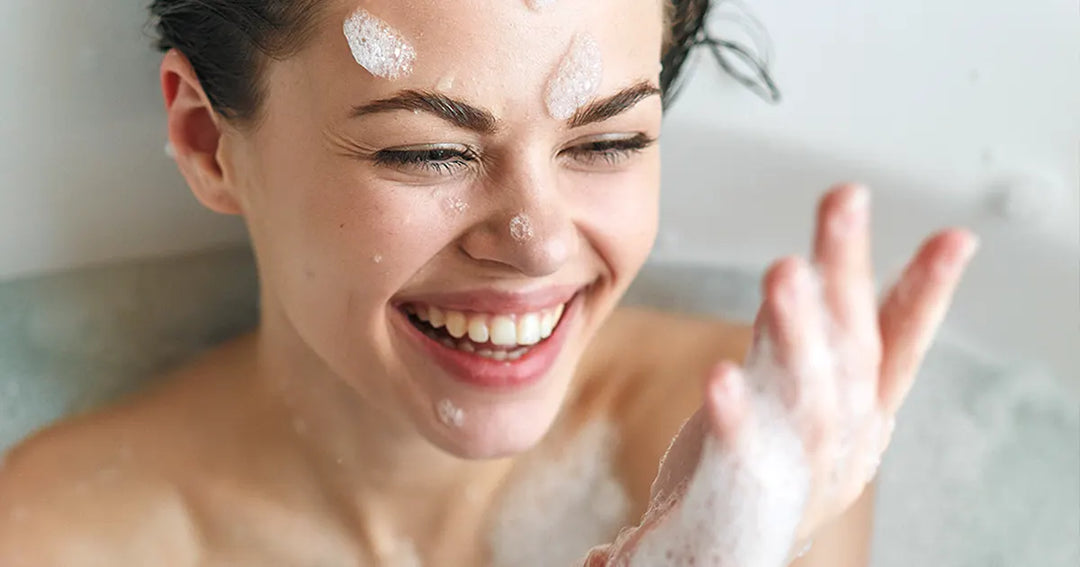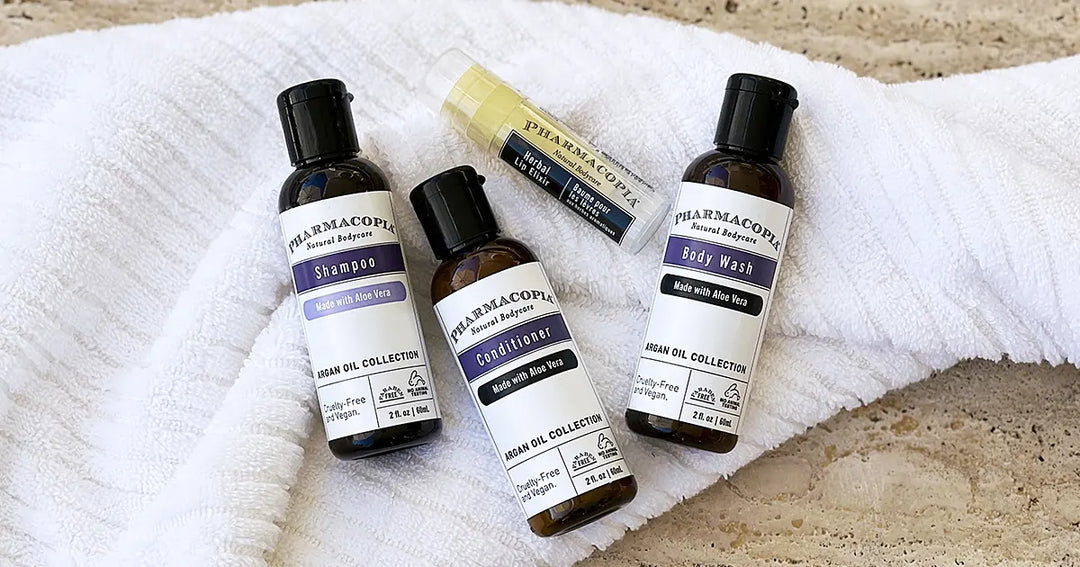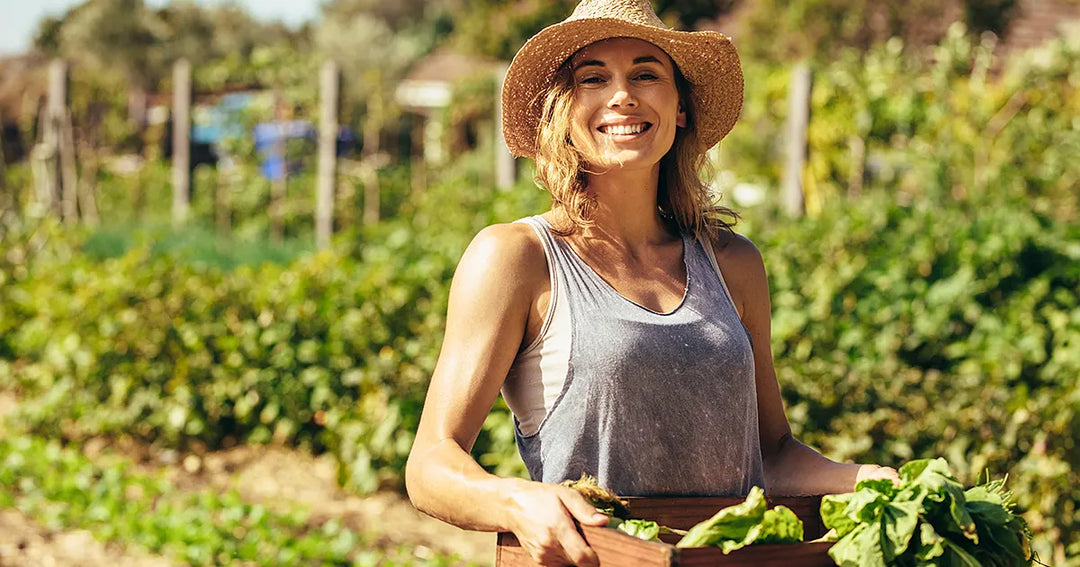A Simple Change: Reduce Single-Use Plastic
When it comes to the environment, each one of us can make a difference every day with little tweaks to our daily routines. That’s always been our philosophy at Pharmacopia: do whatever we can to have a positive impact on our environment for generations to come. For Earth Day, and every day throughout the year, reducing the use of single-use plastics is a small change that can have a big impact on the world around us.
 At Pharmacopia, treating our planet with respect has been in our DNA from the beginning. We’ve been aware of the environmental impact of packaging since we first launched with aluminum bottles and glass jars back in 1999 … way before it was cool! In fact, we were one of the original plastic-free brands. Today, we use 100% PCR (post-consumer recycled) plastic in both our hotel amenities and our retail-sized bottles. We continue to evolve our packaging and practices to be the most sustainable possible. Our current pump is plastic and metal, for example, but we’ll be moving soon to a pump with a removable spring that is fully recyclable.
At Pharmacopia, treating our planet with respect has been in our DNA from the beginning. We’ve been aware of the environmental impact of packaging since we first launched with aluminum bottles and glass jars back in 1999 … way before it was cool! In fact, we were one of the original plastic-free brands. Today, we use 100% PCR (post-consumer recycled) plastic in both our hotel amenities and our retail-sized bottles. We continue to evolve our packaging and practices to be the most sustainable possible. Our current pump is plastic and metal, for example, but we’ll be moving soon to a pump with a removable spring that is fully recyclable.
What are single-use plastics?
Single-use plastics (SUPS) are those plastics that are used once, for a short amount of time, before being tossed in the trash. Water bottles are one of the biggest type of single-use plastics. Today, 60 million water bottles are thrown away every day in America. This seems like a giant waste, right? That’s because it is. These plastics end up in the landfills, taking away space from other trash that can’t be recycled. It also ends up in our oceans, lakes, and rivers, harming the animals and plants that are found in them.
What’s more, it takes 700 years—or more than 7 generations—for just one single-use plastic bottle to break down. 700 years! It gives you pause, right? Drink from one plastic water bottle and toss it in the trash and it will stay around for generations. What’s more, as plastic breaks down, it can leech chemicals from the plastic-like BPA into the ground, the water, and the air. These chemicals can make people, plants, and animals sick.
Other single-use plastics we need to cut down on include straws, coffee stir sticks, to-go utensils that often comes with take-out food, disposable cups, plastic wrappers and bags, and so much more.
Alternatives to single-use plastics
There are plenty of alternatives to using single-use plastics. Here are some examples:
- Use re-usable metal straws instead of disposable ones. If you don’t use metal, consider re-usable silicone straws or try ones made from biodegradable plant-based material called PLA, bamboo, or even paper (though these tend to get soggy after a short period of time, so plan accordingly). Whatever you do, try to avoid using plastic. Americans use half a billion plastic straws every day, a number that has to be reduced for a better environment tomorrow.
- Opt for beeswax wrap instead of plastic wrap or plastic bags. Made from organic cotton coated in coconut or jojoba oil, tree resin and beeswax, this wrap is waterproof, freezer safe, and can last up to 12 months. Skip the plastic wrap and instead, use this to cover leftovers or wrap sandwiches.
- Invest in a re-usable coffee cup. Americans throw away 50 billion coffee cups every year! These coffee cups are coated with plastic to laminate the inside. Then there are all those plastic lids that go with these cups!
- Try re-usable silicone food covers instead of plastic wrap or bags. These covers, made from a derivative of sand called silica, are stretchy and come in different sizes. They’re perfect for covering cut fruits and vegetables or plates and bowls.
- Carry groceries and purchases in re-usable totes instead of plastic bags. Keep a stash by your door or in your car so you don’t forget. That way, you’re helping reduce the five trillion plastic bags that are used every year!
- Buy products, like all our Pharmacopia products, stored in recycled packaging. It should be marked on the packaging by this symbol.
As a result Pharmacopia products using 100% PCR plastic instead of new plastic, we have been able to divert over 150 tons of plastic from landfills each year. What’s more, our bottles are free from the chemical BPA and can be recycled again. This is just one brand; imagine now if you were to buy as many products as possible made from recycled packaging. You could make a world of difference!
Simple steps you can take for Earth Day
To prevent the environment from getting clogged up with single-use plastics, follow the three R’s general rule: Reduce, Re-use, Recycle.
REDUCE: To Reduce your use of single-use plastics, opt out of using plastic straws and other single-use plastics using the steps mentioned above. Also if you order take out, request that they don’t pack plastic utensils or plastic straws with your food. The use of single-use plastics has tripled since the pandemic due to take-out food.
RE-USE: To Re-use single-use plastics, think before you toss. If it’s plastic, see if you can wash it and re-use it. Things like plastic Ziploc bags, cups, and utensils can be washed and re-used. You can also re-use your product bottles by refilling from larger, bulk-size products whenever you can. That’s why we’re now offering our Pharmacopia Hotel Collection Gallon Refills of our Verbena and Argan Oil Shampoo, Conditioner, Body Lotion, and Body Wash. We also offer a gallon refill of our Argan Oil Hand Wash, so you can refill your hand wash pumps at home.
RECYLE: To Recycle, establish easy collection bins at your home or your office for all your plastic containers and bags. Many communities have recycling pick-up days or drop-offs where you can conveniently leave your single-use plastics to be sorted and recycled. When they’re recycled, the plastics are sorted, cleaned, and ground up into shredded flakes. At this point, they’re melted down to form small, rice-size pellets that can then be turned into products made from post-consumer recycled material like our Pharmacopia bottles.
By recycling, these plastics can be diverted from the landfill and turned into something else useful. If plastic bottles, for example, aren't turned into other bottles or containers, they can be made into clothes, furniture, fences, and even insulation for jackets and sleeping bags, to name just a few.
If you follow just one of these suggestions on Earth Day and beyond, you’re making a difference. If you can add steps when you’re ready, your contribution to the Earth grows. The more we can all do every day, the better for our planet!


